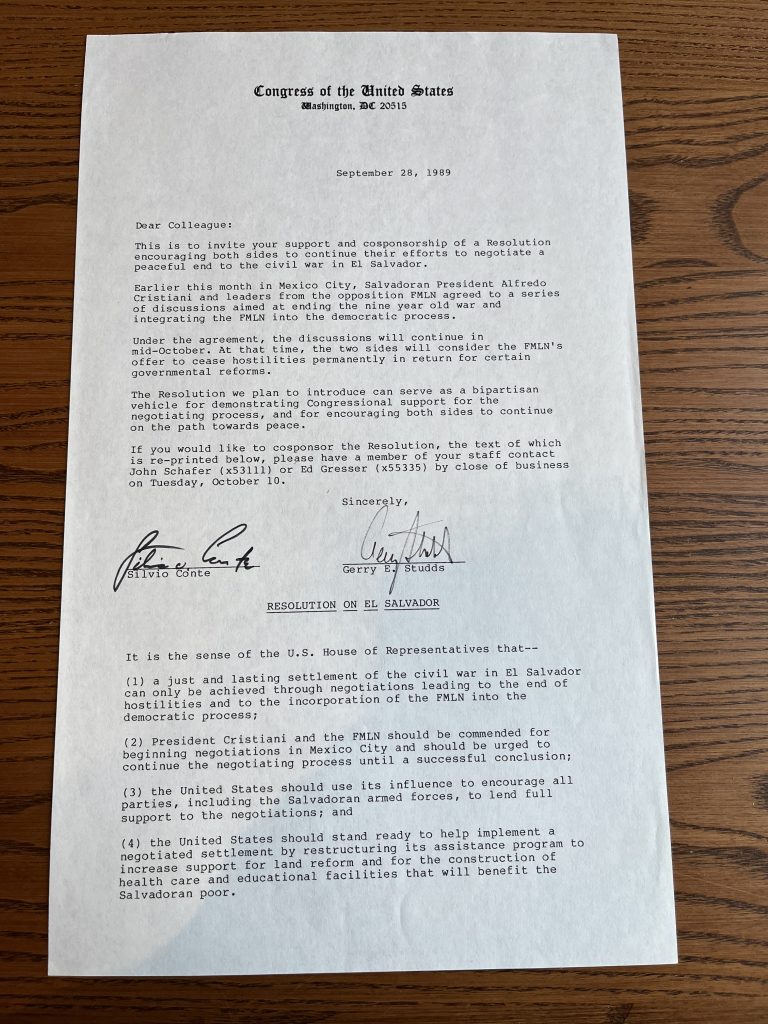by Meg Szydlik, Visitor Services Coordinator
In my previous blog posts here and here, I examined Massachusetts Congressman Gerry E. Studds as a gay man and environmental activist. In this post, I want to look at his antiwar stance, which focused on the violence in Vietnam, and later in South and Central America. While there is less on this in his collection at the MHS than I had hoped, there are still tantalizing glimpses of the antiwar convictions that pushed him to run in the first place.
Prior to his election to Congress, he campaigned for Senator Eugene McCarthy (not to be confused with the anticommunist senator Joseph McCarthy) during his 1968 run at the Democratic presidential nomination. McCarthy’s stance against the Vietnam War attracted Studds. Studds himself then ran for the House of Representatives and was elected on an anti-Vietnam War platform in 1972. The Vietnam War was a civil war between the communist North Vietnam, backed by China and Russia, and anticommunist South Vietnam, backed by the US and France. US involvement in the war, including troops, bombs, and Agent Orange sprays, ended in 1973, then the war officially ended in 1975 with a North Vietnamese victory. The wildly unpopular and casualty-heavy war was captured through photojournalism and news reports that inspired years of peace protests across the country which ultimately resulted in American withdrawal from the conflict. Studds’ election was part of this wave of discontent.

Studds did not only care about the war in Vietnam, however. He was also a strong opponent of the violence in Latin America, including El Salvador’s civil war and Reagan’s support of the Contras in Nicaragua, which culminated in the Iran-Contra affair. The twentieth century was a period of great unrest and revolution in South and Central America, with many previous “banana republics,” dealing with the repercussions of living under exploitation for so long. The Reagan administration supported the Salvadorean government in their civil war, but Studds called for a real inclusion of the revolutionary forces in the negotiations for peace and reform and for the United States to provide support in the negotiated settlement. The extreme human rights violations of the Salvadorean government and its military arm, which was responsible for killing thousands of its own citizens, did not stop the US government from offering billions of dollars in aid to the anti-communist leadership over the course of the war. Studds sought to stop that flow of aid and violence and instead support peace. He expressed that US leaders were “not this hemisphere’s only experts on democracy, social justice, the fair treatment of indigenous populations, or human rights. There are many other supporters of these concepts in Latin America.”

In addition to these examples, Studds also supported nuclear disarmament, another point of conflict between him and President Ronald Reagan. Much of his time as Congressman in the 80s was spent opposing Reagan’s agenda. While a lot of that involved working to protect the rights of lesbian and gay individuals and fund research and support for those suffering from HIV/AIDS, things Reagan famously did not particularly care about, Studds’ environmental activism and anti-war sentiments also clashed with Reagan’s pro-business and Cold War focus. He was far from the only representative to have these positions, but his drafts and letters to other legislators help paint a picture of the movement’s efforts. If you are in Boston, I highly recommend checking out the Gerry E. Studds Papers. Just be sure to request it ahead of time!

